Rambutan, a tropical delight native to Southeast Asian countries like Vietnam, China, Thailand, and the Philippines, is a popular fruit with a sweet taste and an appealing appearance. But what is the nutritional value of this exotic treat, and is it a healthy snack? Let’s explore these questions and more in this comprehensive guide to rambutan.
1 Nutritional Value of Rambutan
Rambutan: A Nutritional Powerhouse
The name “rambutan” originates from the Malay word for hair, reflecting the fruit’s unique appearance with its reddish-green spiky shell. Beneath this intriguing exterior lies a wealth of nutrients.
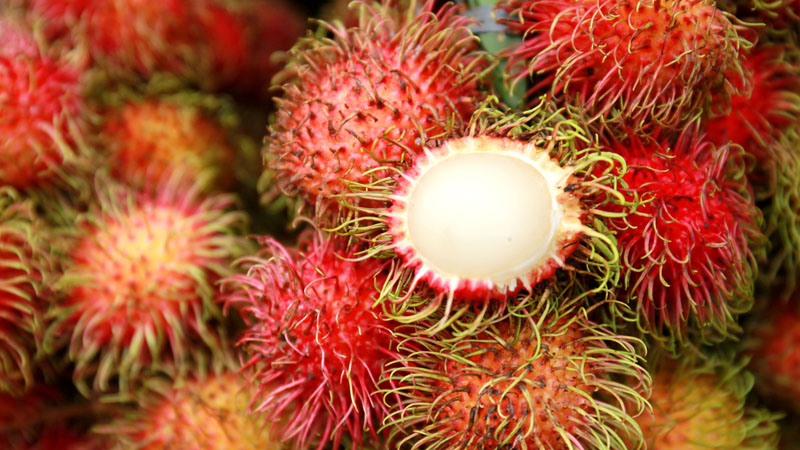 Rambutan: A Nutritional Powerhouse
Rambutan: A Nutritional Powerhouse
According to Vinmec International Hospital, 100 grams of rambutan flesh packs a nutritional punch with 20.87g of carbohydrates, 0.9g of protein, 0.65g of fat, 22mg of calcium, 9g of phosphorus, 4.9mg of iron, 0.21g of zinc, 7g of vitamin C, 42mg of folate, 11mg of riboflavin, and 1.352mg of niacin. Additionally, rambutan contains small amounts of other beneficial compounds like thiamin, pyridoxine, and beta-carotene.
Health Benefits of Rambutan
- Nutritional Powerhouse: Rambutan is an excellent source of essential nutrients, including vitamins, minerals, and antioxidants, promoting overall health and well-being.

The high fiber content in rambutan, ranging from 1.3 to 2g per 100g of edible fruit, aids digestion and prevents constipation. Vitamin C in rambutan enhances iron absorption and acts as an antioxidant, bolstering the body’s defenses against diseases.
Rambutan also contains significant amounts of copper, essential for the formation of red blood cells, bone health, and brain function. Additionally, rambutan is a good source of potassium, magnesium, and other beneficial compounds that contribute to overall health.
- Digestive Health: Rambutan’s fiber content includes both insoluble and soluble fiber, promoting healthy digestion and supporting the growth of beneficial gut bacteria.
Insoluble fiber speeds up intestinal transit time and relieves constipation. Soluble fiber, on the other hand, is fermented by gut bacteria, producing short-chain fatty acids like acetate and propionate, which nourish the cells in the gut and reduce inflammation, thereby improving digestive health.
- Weight Loss Aid: Rambutan, like other fiber-rich fruits, can aid in weight loss by promoting a feeling of fullness and curbing excessive calorie intake.
The high fiber and low-calorie content of rambutan make it an excellent snack for those watching their weight. Soluble fiber in rambutan forms a gel-like substance in the intestines, slowing digestion and enhancing nutrient absorption while reducing appetite.
- Immune Booster: Vitamin C in rambutan stimulates the production of white blood cells, strengthening the body’s defense mechanism against infections.
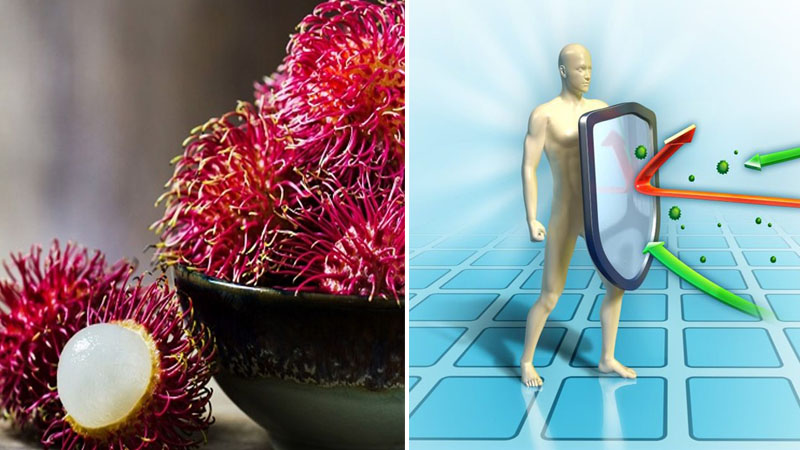 Rambutan Boosts Immune System
Rambutan Boosts Immune System
Additionally, compounds in the rambutan peel offer protection against viral and bacterial infections. However, it is important to note that consuming the peel and seed is not recommended due to the presence of potentially harmful compounds.
- Diabetes Management: According to Chinese nutrition experts, the phenolic compounds in rambutan peels have anti-diabetic properties and can help lower blood sugar levels.
2 Calorie Count in Rambutan
Determining the caloric content of rambutan is typically based on weight rather than the number of fruits. Research indicates that 100 grams of rambutan flesh provides approximately 82 kcal, which is significantly lower than other juicy fruits. Similarly, one kilogram of rambutan yields around 820 kcal.
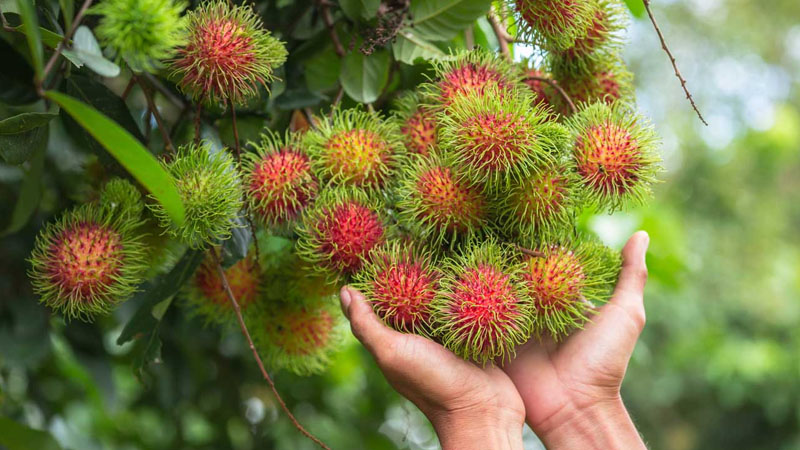 100g of Rambutan Contains Approximately 82 kcal
100g of Rambutan Contains Approximately 82 kcal
3 Does Eating Rambutan Cause Weight Gain?
As mentioned earlier, rambutan has a relatively low-calorie count compared to other fruits, so you can enjoy this tasty treat without worrying about gaining weight. Additionally, the high fiber content aids in faster digestion, boosts metabolism, and helps burn excess fat, making it a weight-loss-friendly snack.
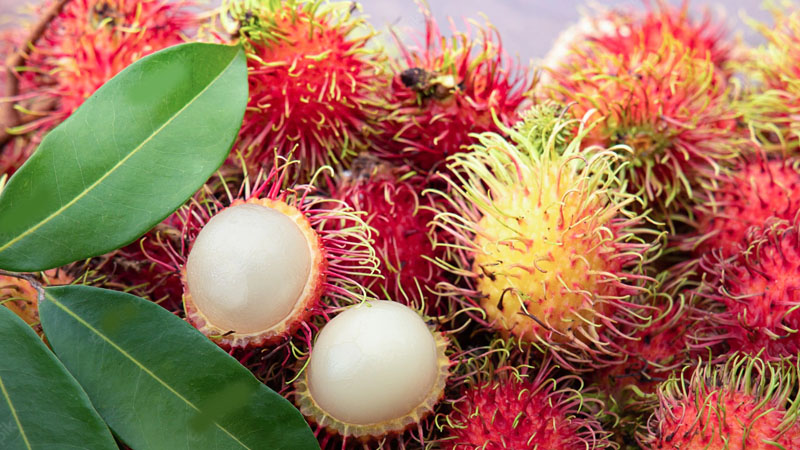 Rambutan: A Weight-Loss-Friendly Treat
Rambutan: A Weight-Loss-Friendly Treat
4 Precautions When Eating Rambutan
Avoid Chilled Rambutan: Consuming chilled rambutan can stimulate your appetite, leading to overeating and potential weight gain.
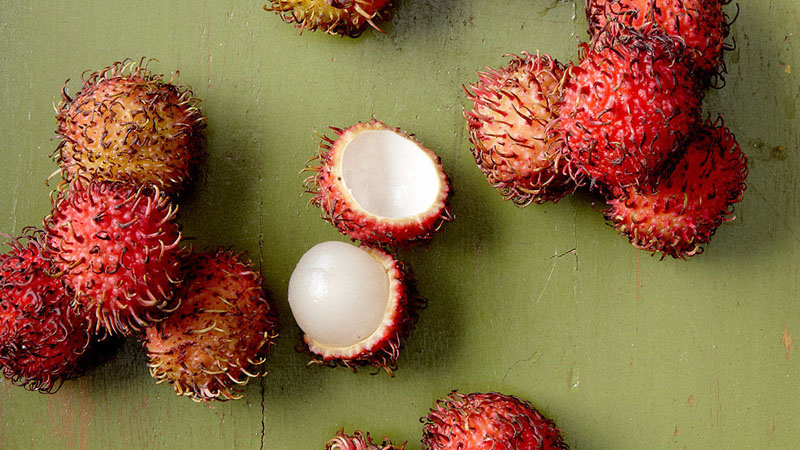 Avoid Eating Rambutan Before Meals
Avoid Eating Rambutan Before Meals
Avoid Eating Rambutan Before Meals: Eating rambutan on an empty stomach can lead to overconsumption, as it is difficult to control portions when hungry. Additionally, rambutan’s natural sweetness can cause a rapid spike in blood sugar levels, leading to a quicker feeling of fullness and reduced appetite for other nutritious foods.
Limit Processed Rambutan Products: Dried rambutan, rambutan jam, and other processed rambutan products tend to have a higher calorie count due to the concentration of sugar. Excessive consumption of these products may contribute to weight gain and increase the risk of diabetes.
Avoid Rambutan During Hot Weather: As a tropical fruit, rambutan can heat the body, leading to skin issues like acne and boils. Overconsumption may also cause digestive problems and negatively impact gut health.
 Pregnant Women Should Limit Rambutan Intake
Pregnant Women Should Limit Rambutan Intake
Pregnant Women Should Limit Intake: Rambutan’s heating properties can be detrimental to pregnant women and their unborn children. Excessive consumption by young children may also lead to skin irritation, rashes, and fever.
5 Delicious Rambutan Recipes
Rambutan is a versatile fruit that can be used to create a variety of delicious dishes.
Rambutan Jam: This sweet treat is a must-have during the Lunar New Year celebrations. The addition of oranges gives the jam a beautiful orange hue, and the resulting flavor is a delightful balance of sweet and sour. However, to prevent weight gain, it is advisable to use sugar substitutes and limit consumption to 2-3 pieces per day.
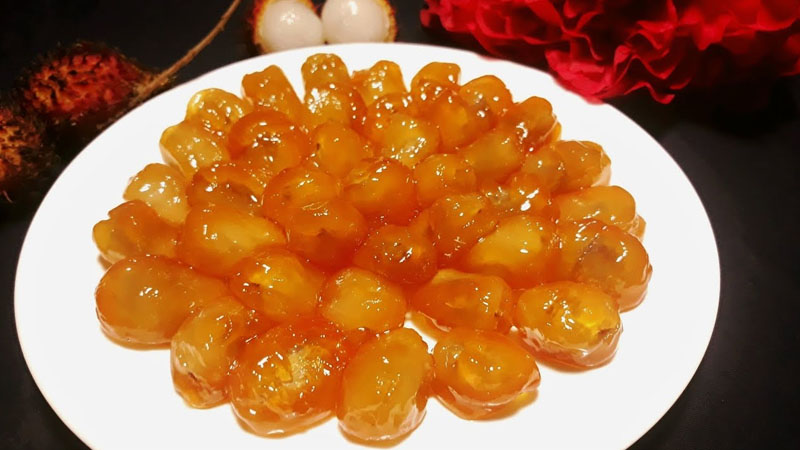 Rambutan Jam
Rambutan Jam
When making rambutan jam, choose ripe fruits with juicy flesh and a balanced sweetness. After preparing the jam, air-dry it for 2-4 hours. Cook the jam over low heat to prevent burning and bitterness. For long-term storage, transfer the jam to a glass jar, seal it tightly, and keep it in the refrigerator.
Rambutan and Lotus Seed Dessert Soup: This sweet and refreshing dessert is a perfect choice for hot summer days. The combination of rambutan and lotus seeds creates a delicious and nutritious treat for the whole family. Preparing this dessert at home is easy and enjoyable for all.
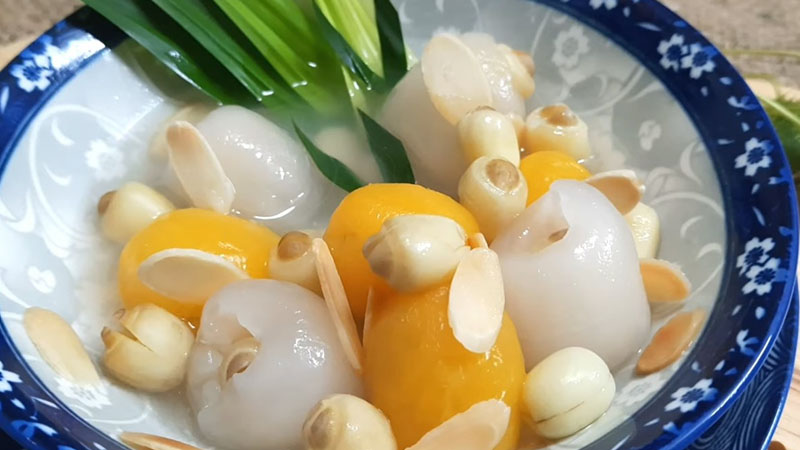 Rambutan and Lotus Seed Dessert Soup
Rambutan and Lotus Seed Dessert Soup
Like rambutan jam, this dessert soup is high in sugar and can contribute to weight gain. To mitigate this, consider using sugar substitutes and engaging in light exercise after consumption to burn off excess calories. This way, you can enjoy the dessert without worrying about your waistline.
Rambutan Salad: For those who love spicy and tangy flavors, rambutan salad is a unique and mouthwatering dish. The combination of rambutan, shallots, chili, and fish sauce creates a delightful blend of sweet, sour, and spicy flavors.
 Rambutan Salad
Rambutan Salad
Rambutan Smoothie: A simple yet refreshing treat, rambutan smoothie requires only rambutan, yogurt, and honey. This delicious blend of sweet and sour flavors is perfect for beating the summer heat. For a twist, add some dragon fruit to the mix for a unique flavor and vibrant color.
 Rambutan Smoothie
Rambutan Smoothie
Beef Stir-Fry with Rambutan: This dish is a flavorful and nutritious blend of beef, rambutan, and various vegetables, including carrots, bell peppers, and onions. The result is a tasty meal packed with fiber and essential vitamins and minerals. The combination of tender beef, juicy rambutan, and crisp vegetables is perfect for a summer feast.
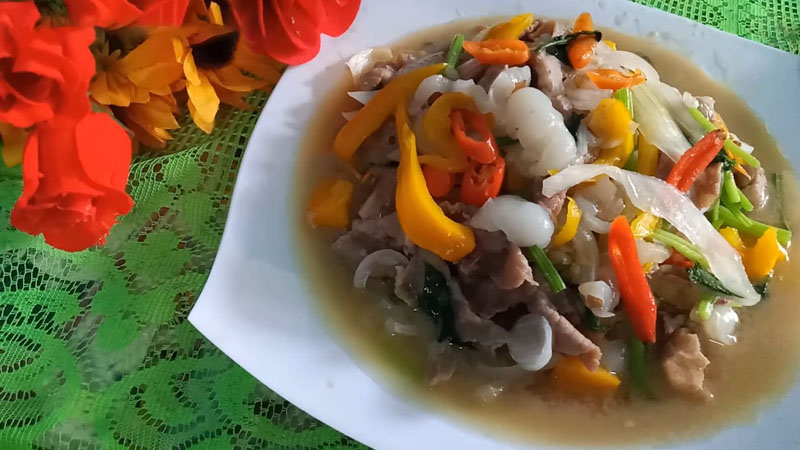 Beef Stir-Fry with Rambutan
Beef Stir-Fry with Rambutan
Reference:
This article has provided an in-depth look at the nutritional value of rambutan and its potential impact on weight gain. We hope it has equipped you with the knowledge to make informed decisions about incorporating this delicious fruit into your diet while maintaining a healthy lifestyle.
Source: Vinmec International Hospital







































